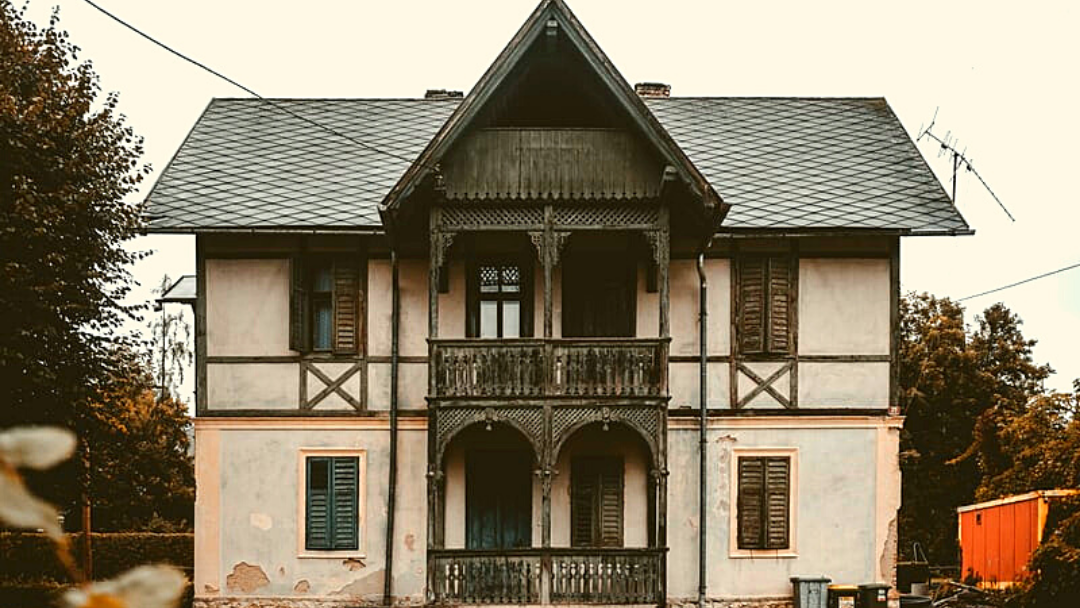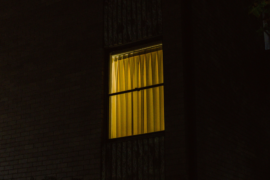THE HOUSE WAS AROUND THE BLOCK, AT THE END OF LEO BABIC’S STREET. It’s long been torn down now. But thirteen winters ago Leo Babic went into it and never came back out again.
Months and even years afterward, my mom and dad would wrap their arms around me so tight they’d knock the wind out of me whenever I’d leave the house for a bike ride or whatever, pressing their faces so tightly against mine like I was shipping off for war and, later at night when I’d return, they’d stare at me as if I’d just sailed around the world, not stopping and going back about their business until I said, “What? What did I do?” They’d say, “Nothing,” and smile smiles that weren’t quite smiles and tell me they loved me. Did I know how much?
Leo had just celebrated his thirteenth birthday, and I was less than a month from following. Leo lived around the block from me, but our backyards were adjacent from one another, with the edges of our fence posts kissing in the right corner of my backyard. We’d been best friends since his family moved here from Croatia five years before. The Babic’s came to love the droll suburbs of northern New Jersey, and the hideous humidity that came with its summers, the bite that chased its winters. Leo and I rode bikes together, shot hoops in my driveway, and, when his dad wasn’t sauced on homemade wine from warding off ghosts that followed him after fighting (and eventually fleeing) the Serbian Aggression, had sleepovers in his basement.
Leo loved having the shut-in at the end of his block. It was something to talk about when we stayed up late with his older brother Alex—what the hell was that guy doing in there? All we knew was his name: Murray. Murray was old, seemed much older back then, like seventy or eighty, but when I think about it now the guy likely wasn’t even fifty.
There were rampant rumors about Murray. We all had our favorites. Murray was a war hero. Murray was brainwashed by the government during MK Ultra (this was Alex, he was a freshman in college and had recently started reading…he knew everything far as I was concerned.) Maybe his whole family died, he was sick, lonely. But, our collective favorite, by far—especially when we were trying to spook each other—was that Murray murdered his family. Hacked them to pieces. Kids in town, especially the older ones (when drunk) would dare each other to go knock on his door, hide in his bushes. If he ever came out they were supposed to capture him on camera.
That was thirteen years ago. I no longer live in northern New Jersey and Leo is no longer alive. Still, this is what I tell my girlfriend when she asks what I’m always thinking about when I get too drunk and start getting that far off look, or why I wake sometimes in the night. I tell her I see Leo and we are talking again, things like this:
It’s just after Christmas, everybody still has up all the bullshit decorations, and Leo is lobbing snowballs from his yard towards my bedroom window, a few hours from his death. He keeps throwing snowballs but I ignore him—I’m not allowed out for something we got into earlier in the week with is brother Alex. He doesn’t stop lobbing snowballs until one of them, pure ice, cracks and splinters my window. I panic, but before I react my dad comes in, yelling. I’m not allowed outside or to see Leo for two weeks.
I sneak out once dad is asleep. I slip through our forsythia bushes and scale the fence, landing in a mound of snow where Leo waits. His parents are passed out on wine. Alex is drinking beers inside the shed, standing with a few people I don’t know. Alex gives us a job to do, and we are at the age where we want more than anything to impress him, to belong—we crave the responsibility.
We are tasked with going to retrieve a left behind 30-rack from Tim’s house, there are girls coming, this is an unexpected development and they are short on beer, a situation that will become dire as the night goes on. He gives us a beer to share, to think it over. I’m in. Leo is, at first, unsure. We take small sips while I watch the shadows from my parents’ upstairs bedroom. Before the beer is finished there is movement in my backyard, rummaging. The floodlights snap on, followed by my dad’s voice, “Home.” There is a lull, then, “Right now.”
From my room I try to watch as Leo moves toward the end of his block, but my view is ruined by the Solimando’s massive place a few houses down from mine. The Solimando’s more or less own the town, with generations going back to the founding sometime in the mid 19thcentury. Solimando spawn is all over the towns payroll as cops, fireman and sanitation workers, to go to the borough hall is like walking in on a family get together. They are nice people though, and they let Leo and I jump on their trampoline whenever we want, not seeming to care when we strip down to our boxer shorts when it gets too hot, our pale little bodies sweating all over their merchandise. They just roll their eyes and smile, leave us iced tea while staying out of our way. Sometimes when they aren’t home we sneak into their house, move around their massive basement and check out their clutter, they never know.
*
I still think about the moment my dad screamed at me, how I left Leo alone, holding the bag. I should have told him to forget about it, it’s only beer. I envision scenarios where I do. “Next time,” I say, “we’ll get another chance.” Sometimes he even listens to me, and instead of leaving his backyard and walking down the block, he tells his brother he is tired and he doesn’t feel like it. Alex is pissed but what can he do, Leo is his brother. But when I get to my room and look out the window it’s still too late, Leo is moving down the block with purpose. The story changes a little bit each time, but the result is always the same: Leo moving quickly and quietly down his block.
As time goes on I remember more, not less. Leo’s face is stamped on my brain—a mix of doubt, mischief and earnestness, like the stud prospect after getting the call from the minor leagues to the show. More than anything it is the look of not wanting to let Alex down.
In the story that runs on all the news outlets there are five bodies in total, Leo’s included. In my mind there were much more, but when I look up the actual article years later on my phone it is still just the five. Leo got the beer, that wasn’t where it went wrong. In his excitement he goes by the house at the end of the block. He wants to snap a picture of Murray, to show up with this and the beer in tow would make him a legend, or at least that is my informed understanding of Leo’s logic.
Murray wasn’t what any of the popular stories said he was, though he was just the same. He thought an unspecified enemy was watching him, and was fighting some endless, invisible war. When they busted in they found the remains of some boys that went missing a few towns over a decade earlier, a mailman who was thought to have walked off the job, an unidentified old woman, and, finally, Leo. He wasn’t a complete shut in (worked part-time down at the water company), but he did live like one—the house likely would have had to been torn down even if it wasn’t hiding a cache of corpses.
In my mind it goes quick, despite the fact that I know the guy called in sick the next couple of days, even though I’m aware some sort of interrogation went on, one that left me unable to view my friend on his final day above ground.
*
Later, after my family moved to Nebraska, and a few more years after that once I’ve moved to Denver and am teaching in the public schools, I get an email from Alex Babic. Alex is recently sober and has a few questions about his little brother. He was your best friend, he says, what was he really like? Most of them are like this. He’s sorry to bother me, but he’s in the recovery process and he thinks this might help. Everyday he wants to drink, and when he isn’t dreaming of drinking he’s dreaming of his little brother.
I wait till I get home from school to answer. I sit down at my desk, a desk at which I thought I might one day write great things, but all my early drafts start and stall on this story, so instead I teach literary devices to kids who are mostly just pretending not to be on their phones. Once I start the email though, things begin to happen. I go into great detail about Leo, his tics and quirks, the things that made him him. I tell Alex about my own dreams, and I even tell him if he were ever out in Colorado to hit me up, I’d love to grab a coffee, maybe go on a hike. When I’m done I don’t send it right away. Instead, I save it to drafts and go to the kitchen, kiss my girlfriend on the lips, pull a beer out of the fridge and begin poring over papers with my red pen. A month later it’s still sitting in my drafts, unsent.
*
It’s a week after New Years, and the husks of Christmas trees line the block. A crowd has gathered around the house at the end the block, at least as far as the police line will allow. Neighbors throw their hands up in disbelief, say things like “how could this happen?” and “I had no idea—did you?” Some are crying, and the few reporters milling about go to them in search of quotes.
When they carry out Leo I instantly know it’s him, even though he’s zipped up in a black bag. Leo’s parents are by the police, his mom is silent while his dad gestures violently, curses in Croatian—he looks like he might take a swing at the cop closest. Instead, he turns and smacks Alex in the back of his head, dropping him to his knees. Alex springs up, wipes the tears from his eyes and pushes past the crowd, and, once he’s around the corner, breaks into a full sprint. People will say how bad they feel for him, having to carry a burden so big so young. Poor kid.
After everyone has gone home to their dinner and bad television shows, my mom comes down, tells me that’s enough, time to come back home.
*
Leo’s parents never speak to me again. I want to tell them I wish, often dream I went with him. I want to tell them how pissed I was I couldn’t go, as it was me who convinced him, me having no brother of my own.
That is really how it went down, I’d say. Try not to blame Alex. However, I will not tell them the other dream I cannot stop dreaming. The one where I go into the house, and Leo sleeps warm in his bed.
Like what you’re reading?
Get new stories or poetry sent to your inbox. Drop your email below to start >>>
OR grab a print issue
Stories, poems and essays in a beautifully designed magazine you can hold in your hands.
GO TO ISSUESNEW book release
I’ll Tell You a Love Story by Couri Johnson. Order the book of which Tim Jeffries said, “Surprising in their originality, filled with broken wisdom, and with a refreshing use of language and imagery, these are stories to savour and mull over one at a time but which add up to a satisfying whole.”
GET THE BOOK



